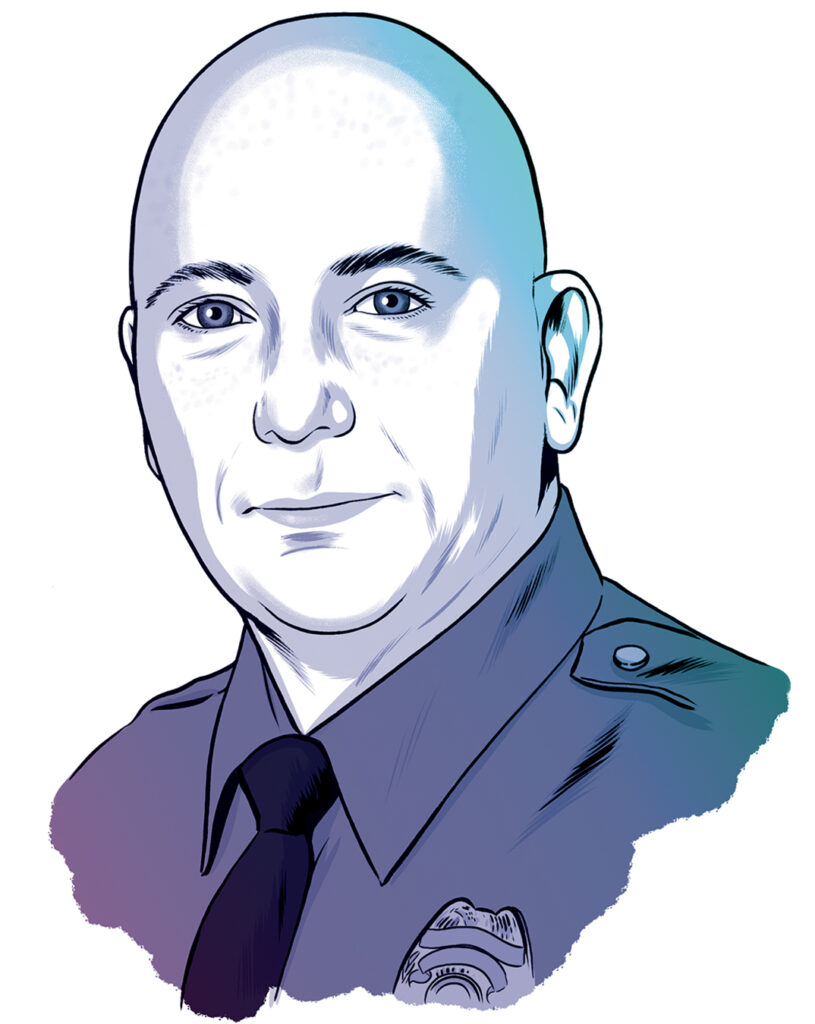Ted Wittke, BA’15, MAS’16 (Metro)
Creating Leaders Within the Force

Ted Wittke (Illustration: Joel Kimmel)
A champion of leadership, training and commitment, Ted Wittke, BA’15, MAS’16 (Metro), took the oath as chief of police in the Hazlet Township [N.J.] Police Department on September 8, 2020 — after 22 years with the department and just four years after receiving his MAS degree.
Since becoming chief, Wittke has implemented a system of leadership training, including supervisory field training for new sergeants.
Officers promoted to the rank of sergeant must first complete supervisory field training. They then attend a frontline supervision course, and the following year they attend a command-level supervision course. “This ensures they are learning the importance of being able to do their bosses’ jobs,” he says.
A U.S. Marine Corps veteran, Wittke first served 13 years in the department’s Uniformed Patrol Division. He was promoted to sergeant in 2012 and lieutenant in 2014, when he rose to his first leadership position as Detective Bureau commander, overseeing investigations and internal affairs.
Wittke credits his Marine Corps experience with helping him get those under his command to work as a cohesive group He says it also helped him instill a sense of duty into his reports. “These traits have helped shape the police leader that I am today,” he says.
After earning his FDU degrees, he was promoted to deputy chief in 2016 and attended the FBI National Academy, a selective 10-week course for law-enforcement executives.
His degrees, he says, “have helped me tremendously. Being able to learn from professors who are experts in their fields, as well as networking with other professionals who shared their successes and failures, was invaluable.”
He particularly praises Ernest “Bub” Kovacs, associate professor of administrative science, and calls him one of the smartest people in his life, and someone he strives to emulate. “No matter the topic, Bub would get you to think, and he would find ways to draw the answers out of you.”
The year after he completed his MAS, Wittke was selected as sergeant-at-arms on the executive board of the FBI National Academy Associates, New Jersey Chapter. He is now third vice president there.
Wittke has seen many changes during his 24 years on the force, many of which are due to outside influences, including social factors such as the public demand to be transparent and accountable.
One struggle he deals with as chief is the loss of many experienced officers due to attrition over the past 10 years. “We have smart, competent officers training newer officers, but the lack of experience is hard to make up for,” he says.
Wittke encourages young people interested in a career in law enforcement to first become a special police officer, a part-timer hired to help full-time officers. “You will get a first-hand look at whether or not the profession is for you. I have seen too many people come and go because the job wasn’t what they thought it would be,” he says.
“And keep plugging away. It took me five years to become a police officer, and I’m glad I was persistent.”